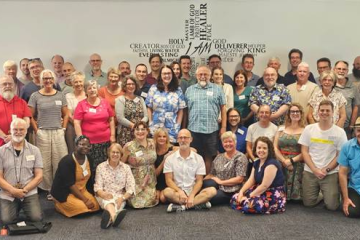Exodus 35:4-5(a), 20-29, 2 Cor 9:6-14
There’s an old preacher’s joke (I am sure you have heard it before) about a minister who gets to his little church one bitterly cold Sunday morning and finds no one there except one old farmer. So, he suggests, considering the low turnout, that the two of them just retire to the back hall, have a cup of tea, and go on their way.
But the farmer says, “Pastor, I’m just a farmer, but when I go to feed the herd, if only one cow shows up, I don’t let her go hungry.’
So, feeling very guilty now, the minister conducts the entire service – hymns, readings, community news and sermon. It goes for a full hour and even just a little over time. And at the door he shakes the man’s hand and says, “I hope you did feel fed this morning.”
And the farmer says, “Pastor, I’m just a farmer, but when I go to feed the herd, if only one turns up, I don’t force her to eat everything I brought for the lot of them!”
Now you might feel a similar way after this morning because I haven’t preached a sermon on financial giving for a while, but this week I found an outline for ‘ten sermons in one’ on the subject and I could not resist.
But I also like the reminder that this Bible we read is a complex and multifaceted book with many things to say on many subjects – definitely many things to say about money – which is also a multifaceted part of our lives; a necessity, a necessary evil, something that can be an evil, that can dominate and control us, and something that can be used in wonderful, life-giving ways to be part of the work that God is doing in our world.
So, sermon one is: Everything belongs to God anyway
This was the basis for the Old Testament teaching around tithing. Setting aside a tithe, one tenth, of their produce every year was to help the Israelites remember, the majority of whom were subsistence farmers, that what the land produced was a gift from God and not the result, purely, of their own efforts or that of pagan agricultural gods. As Psalm 24:1 says: “The earth is the Lord’s and all that is in it, the world, and those who live in it.”
But as we move further and further from simpler ways of living, is it harder to acknowledge that everything belongs to God? Are we tempted to say, it might be God’s money, but it feels like mine! I worked for it. I saved it, and I’m be the one to decide how to spend it.
But if we declare ourselves the captains of our finances and our fates, are we better off than those who confess their reliance on God and on others? The Bible and our own experience tell us, no. Soren Kierkegaard writes, “…riches and abundance come hypocritically clad in sheep’s clothing pretending to be security against anxieties and they become then the object of anxiety…they secure a man against anxieties just as well as the wolf which is put to tending the sheep secures them… against the wolf!”
Receiving what we have as a gift and making this gift available to others is the path to experiencing freedom from anxiety. It is what allows us to live in the freedom of the kingdom of God.
Sermon two: The business case
There might be times where it is necessary to lay out the business case.
In other words, this church is offering you some services – services of worship, pastoral care, church administration, programmes for youth and young adults and families and other groups, outreach opportunities etc etc. – and in order to maintain these you need to pay. There is also the phone and electricity bill (please keep paying for the heating!) and we send funds to the Association so they can also provide us with essential services.
In author and radio host, Garrison Keillor’s fictional stories about a Minnesota town, Lake Wobegon, he writes that none of the Lutherans there ever wanted to talk about money. “Some Sunday,” he said, “Somebody ought to stand up and say, ‘Listen, you know we’ve got expenses around here. Think about what you gave last year. Give a little more this year and add ten percent on top of that because you’re a bunch of tight-fisted Norwegians.”
My apologies to any Norwegians here, but perhaps we can all identify a little.
Sermon three: You must give in order to receive.
This is the notion that the more we give to God, the more God blesses us in return There is certainly biblical backing for this. Speaking through the prophet Malachi, God says, “Bring the whole tithe into the storehouse, that there may be food in my house. Test me in this…and see if I will not throw open the floodgates of heaven and pour out so much blessing that there will not be room enough to store it.” (Malachi 3:10)
Somehow in a lot of people’s thinking, this has been turned into a spiritual formula. Give God ten dollars and God will send you fifteen. But I don’t think that’s how it works. I think it works much more like the story Ella told me this week of her friend whose response to every disappointment in life is to give; whose advice to Ella when life is difficult is, “Give.” And the incredible character she developed as a result; character that reflects God’s character, who desires nothing more than to throw open the floodgates of heaven and pour out blessing…
Sermon four: Money is dangerous—so use it wisely!
Jesus spoke more about the spiritual dangers of wealth than any other issue and yet we tend to avoid those passages. A few years ago, I quoted Rick Warren, pastor of the sixth largest church in the US and author of New York Times bestseller, The Purpose Driven Life, who realised he had ‘missed’ the biblical emphasis on giving to others, especially the poor.
He writes, “…I went back, and I began to read scripture, and it was like blinders came off. Now, I’ve got three advanced degrees. I’ve had four years in Greek and Hebrew, and I’ve got doctorates. And how did I miss 2,000 verses in the Bible where it talks about the poor? How did I miss that? I mean, I went to two different seminaries and a Bible school; how did I miss the 2,000 verses on the poor?”
Wealth can blind us to seeing other’s needs and tempt us to put our own needs and wants ahead of everything. Giving faithfully to God is a good way to master our money so that it doesn’t master us.
Sermon five: It is more blessed to give than to receive
I have a clear memory of being taught this verse. I was four years old and standing in front of a Christmas tree and I was being told this by my uncle – my young uncle – who was 11 at the time. It didn’t go down well!
And I find that that’s the way it is every time. It is an internal wrestle to part with things or with money, despite the fact that I know when I do; it will feel wonderful; it will give delight to others which in turn will create delight in me, it will be a blessing.
Because the best giving is an act of love. That is part of the challenge for translators working with our passage from Corinthians this morning because Paul uses the words ‘money’, ‘grace’ and ‘fellowship’ here almost interchangeably. For Paul ‘grace’ and ‘money’ belong together. The divine generosity of God is the same grace that becomes financial generosity in the life of Christians. Can we, like the Corinthians, like our great and generous God, think of acts of love and gifts of money as interchangeable?
Sermon six: Give your fair share.
In the letter Ian is handing out this morning it states that our budgeted offerings for next financial year require an increase of 2.5% or $130 per week – or if we were to balance the budget, without drawing on reserves, 6.8% or $220 per week.
I saw one estimate of how much this would mean per person and sometimes sermons on giving take this approach. They take the annual budget, divide that by the households in the congregation, and ask everyone to pay their fair share. The problem is that fair is not always fair, that this amount creates difficulties for some and is well below the giving of others.
There is one version of percentage giving that has stood the test of time, however….
Sermon seven: Tithing – giving God a tenth of our income
As I mentioned earlier tithing is part of the Old Testament laws given to the people of Israel. According to Deuteronomy 14 they were to: Set apart a tithe of all the yield of your seed that is brought in yearly from the field. In the presence of the Lord your God, in the place that he will choose as a dwelling for his name, you shall eat the tithe of your grain, your wine, and your oil, as well as the firstlings of your herd and flock, so that you may learn to fear the Lord your God always. But if… the distance is so great that you are unable to transport it…turn it into money. …go to the place that the Lord Your God will choose; spend the money for whatever you wish—oxen, sheep, wine, strong drink, or whatever you desire. And you shall eat there in the presence of the Lord your God, you and your household rejoicing together.
This is very different to the picture of tithing I grew up with. For one week every year the people of Israel were to go to Jerusalem and party! And every three years they were to take the tithe and give it to the priests who could not work the land, to widows and to orphans and to resident aliens.
Jesus also spoke about tithing and more generally about God’s call to share our resources with each other and with those in need. This was the practice of the early church and why Paul writes here to the Corinthians, “Each of you must give as you have made up your mind, not reluctantly or under compulsion, for God loves a cheerful giver…. for the rendering of this ministry not only supplies the needs of the saints but also overflows with many thanksgivings to God.”
Tithing might still be a useful practice for you, but, as Paul says, each of us must decide what we will give. Rick Warren has said that, having sold over 30 million copies of The Purpose Driven Life, he has adopted a ‘reverse tithe’; living comfortably on 10% of his income and giving away the other 90. The overwhelming principle is that living out the good news of Jesus flows obediently and naturally into generous, thankful – and cheerful! – giving to others.
Sermon eight: Give to make a difference
Giving makes a huge difference.
The good news is that poverty is declining rapidly around the world. Between 1990 and 2015 the number of people living in extreme poverty (on less than $1.90 a day) had plummeted from more than 1 in 3 (35.9%) to 1 in 10 (10%). The number of children dying before their fifth birthday had halved. And if you take an even longer view, the average global lifespan back when Australia federated in 1901 was around 36. Today it has doubled to approximately 72.
I’m a little off topic perhaps, talking more about our Thank offering and Christmas offering than our operational budget, but you get the point. Giving can make a huge difference.
Sermon nine: God is holding your IOU—and it’s a big one!
“What shall I return to the Lord for all his bounty to me?” asks the psalmist. (Psalm 116:12)
This can be a pretty good stewardship motivator or a pretty bad one. If we are trying to repay God for being good to us, that doesn’t fit very well with our understanding of grace. We can’t possibly pay God back, and I don’t believe God wants us to attempt to do so.
Finally, sermon ten: Barn raising
Reading Exodus 35 this week, I was reminded of images of barn raising – specifically that scene of the barn being built in Witness. Because as they did there, here we have everyone participating, we have everyone bringing their own unique gifts and giftings –“skilful women… [bringing] what they had spun”, “women whose hearts moved them to use their skill”, leaders, men, I’m guessing children and young people, too, “everyone whose heart was stirred, and everyone whose spirit was willing” – and we have everyone giving in abundance. Such abundance that if you read on into chapter 36, the artisans in charge come to Moses and say, “Make them stop. It’s too much!” And Moses sends the message through the camp, “No man or woman can make any more offerings.”
This offering was not required; it wasn’t one of the mandated sacrifices. In fact, we’re told eight times in this story that these are offerings that spring from the free will of the people. They give out of thankfulness. And they give because it is a way of giving themselves to this wonderful, life-giving work that God is doing among them.
Giving is never just giving. It is always about giving ourselves – investing ourselves. It is God giving us an opportunity to contribute – our energy, our prayers and our money – to the wonderful, life-giving work that God is doing among us.
Our goals as a church as ‘to explore what it means to follow Jesus today, to build a caring inclusive community and to share God’s love in our worlds and actions.’ As we reflect on those, can I ask you – as your heart is stirred and as your spirit is willing – to re-dedicate yourself generously to the work that God is doing here through each one of us.
Rev Belinda Groves, 23 June, 2019
(With a huge debt to H. Michael Brewer’s sermon preached on 23 Sept, 2018
and Scott Higgin’s book, The Single Thing – that can change the world )


